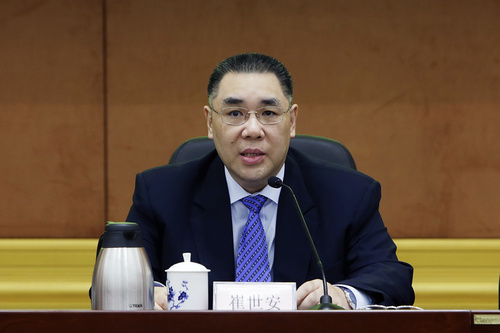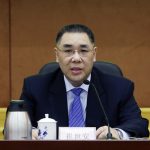 The Chief Executive, Mr Chui Sai On, speaks at the briefing session for sharing new policies and aspirations that had been set out in the recently concluded “Two Sessions”.
The Chief Executive, Mr Chui Sai On, speaks at the briefing session for sharing new policies and aspirations that had been set out in the recently concluded “Two Sessions”.
The Chief Executive, Mr Chui Sai On, today outlined four routes to integrate Macao further in the country’s development, and to make better use of the supporting measures for Macao laid down by the Central Government.
The Government’s efforts include an in-depth study on the initiative of a city cluster in the Guangdong-Hong Kong-Macao Greater Bay Area, as outlined by Premier Li Keqiang in his latest government work report.
Mr Chui made the remarks today as he attended a briefing session sharing new policies and aspirations that had been set out in the recently concluded sessions respectively of the National People's Congress (NPC) and the Chinese People's Political Consultative Conference (CPPCC), events collectively known as the “Two Sessions”.
Getting a better understanding of the aspirations set out in the “Two Sessions” – together with concerted social efforts – would help maintain Macao’s stability and prosperity, and contribute to the pursuit of further economic development, said Mr Chui.
The four routes Mr Chui put forward regarding further integration of Macao in the country’s development were:
1) to make use of Macao’s unique advantages by expediting goals set out in Macao’s Five-Year Development Plan – in particular, the transformation of Macao as a world centre of tourism and leisure and a commercial and trade cooperation service platform between China and Portuguese-speaking countries (collectively known as “Centre and Platform” policies). With regard to these matters, the Government would strengthen its connections with regional partners, in particular with Guangdong Province and Fujian Province;
2) to implement effective measures to tackle livelihood issues. This would include creating further favourable conditions to enhance the overall living conditions of the Macao public, by prioritising housing and transport issues, and by speeding up cross-boundary infrastructure projects;
3) to support the development of young people and promote a patriotic spirit among them. This would include making better use of the increased opportunities for Macao students to receive education in higher education institutions on the mainland; and encouraging further exchanges between young people via the Government-organised “Thousand Talents Programme”;
4) to intensify public administration and legal reform, so as to enhance the effectiveness of governance. The Government would boost efforts regarding simplification of administrative processes, the promotion of anti-corruption measures, and improvement of cross-departmental cooperation.
Mr Chui also shared his personal understanding of key themes from the “Two Sessions”: all Government officials should act in line with the Constitution and the Basic Law; there should be steadfast protection of national sovereignty, security and interests; better use should be made of the “One country, two systems” principle; and further use should be made of Macao’s unique advantages.
The Vice Chairman of the CPPCC, Mr Ho Hau Wa, also attended the briefing session and highlighted the community’s support for the lawful governance of the Chief Executive and the Government. Mr Ho stressed that the success of the coming Legislative Assembly Election – an event due in September – would be particularly important in confirming Macao’s political environment and would serve as an example under the “One country, two systems” principle.
The Director of the Liaison Office of the Central People’s Government in the Macao SAR, Mr Wang Zhimin, urged people to maintain their optimism about the development prospects of the country and of Macao, and to join hands for the sustainable development of the city.
People from different sectors should continue to uphold a patriotic spirit toward the country and to Macao, and jointly build Macao as a better and more prosperous home for all, added Mr Wang.


